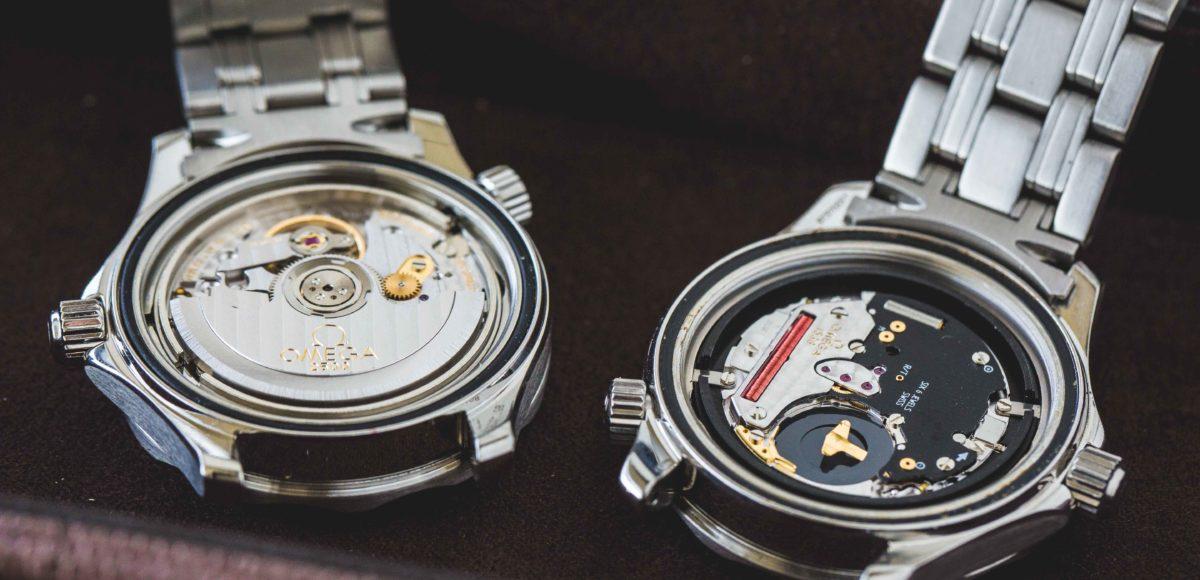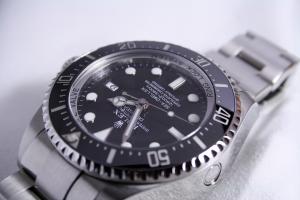Quartz Vs. Automatic Watches: Which Is Better?

Since the 1960s, debates have raged amongst both watch lovers and the industry itself over which is better: quartz or automatic.
Whilst most purists would have you believe that there is nothing like the precision and tech of a mechanical watch, the modern technology behind the quartz movement certainly has its fair share of impressive features.
As we will see in this article, whether the quartz or automatic watch movements is better really depends on the specific needs of the user.
So, without further ado, let us begin our investigation into quartz and automatic watches before discovering which technology is better.
Quartz vs. Automatic Watches: The Origins
The first automatic or mechanical watches were developed from clocks into pocket watches in 15th-century Europe. Initially reserved for royalty and nobility, these early watches were designed to be worn around the neck. Plus, it must have been a pain in the neck because these watches were on the heavier side. In fact, Germany developed one of the first of these watches.
It was not until the late 1600s when the British began to really popularise the use of pocket watches among the gentry. These early examples were made by highly skilled craftsmen in major urban centres such as London, Manchester, and Bristol. This British domination of the watch industry continued until the 19th century when Swiss watchmakers began to make their presence known.
A Swiss man named Abraham-Louis Breguet is frequently cited as the very first craftsman to design and market a wristwatch. Initially designed only for women, early wristwatches had suddenly become popular amongst men by the early 20th century. Indeed, by the time WWI rolled in, wristwatches were a common item among soldiers, and just ten years after the end of the war, pocket watches had virtually disappeared.

For the next thirty or so years, mechanical watches would become increasingly popular across the world, with Swiss brands dominating the market due to their superior quality and meticulous attention to detail. Then, in the mid to late 1960s, the watchmaking industry changed forever with the introduction of a brand new technology from the far east.
The Introduction of Quartz Watches
Initially developed by Japanese watch brand Seiko, quartz movement timepieces were able to provide a cheaper, more accurate alternative to mechanical watches. As a result, the Swiss market almost completely broke down as these new watches quickly came to dominate the market. It is a period now referred to as the ‘Quartz Crisis’ that characterised much of the 1970s and ’80s.

The Swiss were eventually able to respond, although they took their time. Some of the world’s most prestigious watchmaking names such as Patek Philippe and Rolex were forced to create cheaper, quartz-based models. But of course, they made sure to give it the Swiss high-end feel. The release of the Swatch brand solidified the Swiss budget-watch niche and stabilised the region’s flagship industry.
The introduction of quartz watches changed the industry forever. These days, the world’s watches are more than 90% quartz movement. The quartz crisis of the 1970s and ’80s killed off over two-thirds of the Swiss watch workforce, with dozens of companies going under for good.
To understand the nature of quartz movement watches and why they were such a revolutionary introduction, it is important to understand what exactly they are.
What exactly is a Quartz Movement Watch?
Known for their accuracy, durability, and affordability, quartz movement watches are now the dominant form of watch technology on the planet.
The function is wonderfully simple. These watches run off the power of a battery that revolves around a tiny, vibrating quartz crystal around 33 times per second. The constancy of this frequency is so that it provides a measuring stick for the watch to measure time from.

With so few moving parts, these watches are cheap and rarely break, hence their immense popularity. The simplicity of quartz watches also makes them extremely accurate.
So, with such a seemingly perfect form of watches dominating the market, why would anyone choose a mechanical or automatic watch?
Let’s take a look…
What exactly is an Automatic Movement Watch?
The mechanical watch represents the very first technology in horology and dates back many centuries. As a result, this style is less accurate and durable than quartz, whilst being much more expensive and difficult to make. In addition, mechanical watches require frequent servicing in order to function properly.
You might be forgiven for thinking, then: why on earth would anyone want to own one of these things?

Well, the answer is complicated and lies very much in personal preference. See, the difference here is an age-old one that defines many arguments about the nature of taste itself. Classic vs. modern is a debate that continues to rage among consumers across many industries including motoring, fashion, and of course watchmaking.
Further Discussion
The difference between quartz and mechanical watches is, many would argue, the soul.
The exceptionally high level of skill and passion that goes into making just one mechanical watch pales in comparison to mass-produced quartz watches. Watchmaking of this level is up there with some of the humanities’ most incredible feats of engineering, with these items incredibly complex both inside and out. Indeed, the industry today focuses on simultaneously paying homage to traditions whilst pushing the boundaries of mechanical watchmaking functions.
Mechanical watches exist in both manual and automatic styles. Manual watches require the wearer to regularly wind up the mechanism in order to continue measuring time. On the other hand, automatic versions run off the kinetic energy created by the wearer’s wrist movements.
A Comparison
For the purpose of this article, we’ll focus on automatic mechanical watches. As you might imagine, this incredibly complex technology frequently runs into issues. This is due to the sheer number of components involved, which often number in the hundreds.
Now that we have covered the differences between the two styles of watches, let’s take a look at the current state of the quartz vs. automatic watch debate.
Quartz vs Automatic Watches Today: The State of Play
These days, the debate between quartz and automatic watches is very much alive. Most of the world’s finest watches are automatic, mechanical items created painstakingly by some of the globe’s finest micro-engineers. These watches frequently sell for hundreds of thousands of dollars. In fact, the oldest and rarest can sell at an auction for millions.
Automatic watches are very much a purists game, something for those who enjoy tradition and craftsmanship above all else. Naturally, they are also something of a status symbol due to their extremely high cost and rarity. Only the world’s richest people can collect these watches as a hobby.

On the other hand, quartz watches provide a wonderfully accurate, cheap, and durable alternative to the classic style. And no, quartz-based watches aren’t cheap, mass-produced items, but the cost of a quartz movement piece tends to be significantly lower than their mechanical cousins.
Quartz watches are popular among all types of watch wearers, from children’s novelty watches all the way up to masculine dive timepieces from some highly-esteemed brands.
As we have already mentioned, the difference between quartz vs. automatic watches is purely a matter of personal taste.
How to Choose a Quartz or an Automatic Watch
For those seeking investment, an item to pass down to your children, or simply one to savour for the rest of your days, go for an automatic mechanical watch. Not only are these timepieces frequently beautiful items, but they are also a window into history and human ingenuity across the centuries.
In contrast, a quartz watch isn’t so much an investment as a practical way to tell the time. With that said, there are some wonderful quartz watches that not only function well but look the part, too. By making a significant purchase of a quartz watch, you are buying something that should last for many lifetimes.

You can purchase some of the cheaper automatic watches brand new for around $1,000. But there really is no limit to the upper mark for this heritage technology.
As far as quartz watches are concerned, they can cost as little as $20. Yes, that cheap, if you’re not too picky! Premium versions from brands like Omega use modern technology and sell for as much as $5,000.
Key Points to Consider
All in all, both quartz watch movements and automatic have their benefits. The former generally appeals to the more casual watch wearer. The latter is very much a purist’s item that appeals to our love of tradition and craftsmanship.
Final Words
It’s a waste of time to claim that one technology is better than the other. It is much more sensible to take quartz and automatic watches as separate things altogether. After all, it makes no sense to compare two extremely distinct technologies. More so, since each has its fair share of merits and drawbacks.
When choosing a new watch, it is important to consider between quartz vs. automatic. Your choice impacts the item’s durability, design, accuracy, price, and need for servicing.
Regardless of which style you go for, it goes without saying that one of life’s great pleasures is purchasing a brand new timepiece.
Have a look at some of the most celebrated rose gold watches around!


